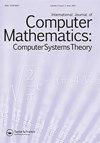近距离观察热带密码
IF 0.6
Q3 COMPUTER SCIENCE, THEORY & METHODS
International Journal of Computer Mathematics: Computer Systems Theory
Pub Date : 2020-11-28
DOI:10.1080/23799927.2020.1862303
引用次数: 17
摘要
我们研究了最近提出的两个基于热带矩阵代数的公钥交换协议。我们观察第一个显示模式的协议。我们引入了对第一个协议的快速攻击,该攻击利用该模式在几秒钟内提取协议的私有参数,从而提取共享密钥。我们继续表明,第二项议定书不能按照提案中所描述的那样执行。协议依赖于关联操作。我们用反例证明了这个运算不是结合式的。本文章由计算机程序翻译,如有差异,请以英文原文为准。
A closer look at the tropical cryptography
We examine two recently proposed public key exchange protocols that are based upon tropical matrix algebras. We observe the first protocol to exhibit a pattern. We introduce a fast attack on the first protocol that exploits this pattern to extract a private parameter of the protocol, and consequently the shared key, in seconds. We go on to show that the second protocol cannot be implemented as it is described in the proposal. The protocol is reliant on an operation being associative. We prove by counterexample that this operation is not associative.
求助全文
通过发布文献求助,成功后即可免费获取论文全文。
去求助
来源期刊

International Journal of Computer Mathematics: Computer Systems Theory
Computer Science-Computational Theory and Mathematics
CiteScore
1.80
自引率
0.00%
发文量
11
 求助内容:
求助内容: 应助结果提醒方式:
应助结果提醒方式:


